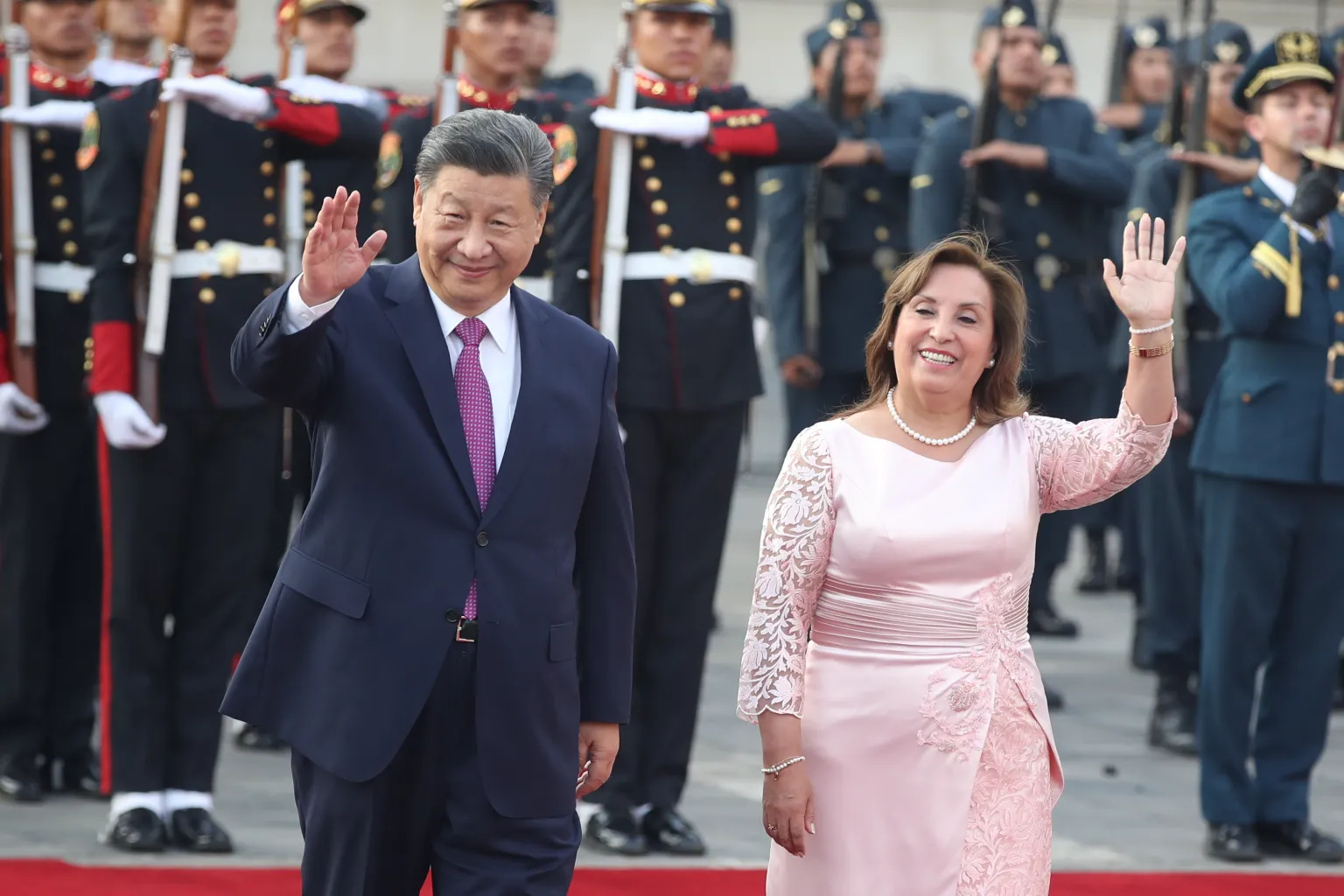International
Boluarte and Xi inaugurate Chancay megaport, called to be a bridge between China and A.Latina

The Peruvian president, Dina Boluarte, and her Chinese counterpart, Xi Jinping, remotely inaugurated the Hancay megaport, located about 70 kilometers from Lima, which will seek to become a bridge that commercially connects China with Latin America.
“Go ahead,” Boluarte said from the Government Palace, next to Xi, to inaugurate the port, after hearing from the main pier that the construction of the port “has been completed in its entirety and the conditions for the start of operations have been met.”
Boluarte and Xi made a remote inauguration
The leaders observed on a huge screen how the brand new infrastructure began to work and, in a symbolic way, a container of Peruvian blueberries was loaded on a ship bound for China, while, simultaneously, a container with electric vehicles was deposited in a Shanghai port on a ship bound for Chancay.
They declared that the inauguration of this “emlecotic project” is a historic moment for the bilateral relationship between the two countries.
“Chancay becomes a new starting point of the Inca road of a new era. From Chancay to Shanghai,” said the Chinese president when expressing his satisfaction with the construction term of the first smart and green port in Latin America.
He indicated that this work, whose initial investment has been 1.3 billion dollars, will reduce the time of maritime transport between Peru and China by 10 days, and will save 20% of the logistical cost, in addition to bringing job opportunities to Peruvians and at the same time consolidating the Andean country as a logistics ‘hub’.
“We sail shoulder to shoulder to embrace the world and move towards a more beautiful tomorrow,” Xi concluded.
New stage of economic development of Peru
For his part, Boluarte maintained that the start of port operations is the beginning of a new stage of economic development for Peru, and that it also shows that the Andean country is a reliable partner.
“We are starting a transformation that will consolidate the country as a world-class technological and industrial logistics center that will strategically project us in the Asia-Pacific region,” he said.
He also stated that this port will contribute one percentage point to the country’s GDP once, once its operations have started, so “its importance is undeniable.”
He reiterated the bonds of trust with China as its largest trading partner, but also as a “sister country” that has played a fundamental role in the construction of the infrastructure that will help place Peru as a logistics center also for Latin American partners, since it will be a gateway between both worlds.
International
Dominican ‘False Hero’ Arrested for Faking Role in Nightclub Collapse That Killed 231

A man identified as Rafael Rosario Mota falsely claimed to have rescued 12 people from the collapse of the Jet Set nightclub in Santo Domingo—a tragedy that left 231 people dead—but he was never at the scene.
Intelligence agents in the Dominican Republic arrested the 32-year-old man for pretending to be a hero who saved lives during the catastrophic incident, authorities announced.
Rosario Mota had been charging for media interviews in which he falsely claimed to have pulled survivors from the rubble after the nightclub’s roof collapsed in the early hours of April 8, during a concert by merengue singer Rubby Pérez, who was among those killed.
“He was never at the scene of the tragedy,” the police stated. The arrest took place just after he finished another interview on a digital platform, where he repeated his fabricated story in exchange for money as part of a “media tour” filled with manipulated information and invented testimonies.
“False hero!” read a message shared on the police force’s Instagram account alongside a short video of the suspect, in which he apologized: “I did it because I was paid. I ask forgiveness from the public and the authorities.”
Central America
Nicaraguan Exiles to Mark 7th Anniversary of 2018 Protests with Global Commemorations

The Nicaraguan opposition in exile announced on Thursday that it will commemorate the seventh anniversary of the April 2018 protests against the government of President Daniel Ortega and his wife, Rosario Murillo, with events in Costa Rica, the United States, and several European countries.
The commemorative activities—which will call for justice for the victims, as well as freedom and democracy for Nicaragua—will include religious services, public forums, cultural fairs, and other public gatherings, according to official announcements.
In April 2018, thousands of Nicaraguans took to the streets to protest controversial reforms to the social security system. The government’s violent response quickly turned the demonstrations into a broader call for the resignation of President Ortega, who is now 79 and has been in power since 2007.
The protests resulted in at least 355 deaths, according to the Inter-American Commission on Human Rights (IACHR), although Nicaraguan organizations claim the toll is as high as 684. Ortega has acknowledged “more than 300” deaths and maintains the unrest was an attempted coup d’état.
International
Arsenal stun Real Madrid at the Bernabéu to reach Champions League semifinals

Arsenal enjoyed a “historic night” on Wednesday after defeating Real Madrid 2-1 at the Santiago Bernabéu, knocking them out of the Champions League quarterfinals, midfielder Declan Rice said.
“It’s such a special night for this club, a historic night for this club,” said Rice, who scored twice in the first leg in London, speaking to TNT Sports.
The English international was named Man of the Match in both legs — the 3-0 win in London and the second leg in Madrid.
“It’s amazing. I knew we were on an upward trajectory and we’ve done incredibly well in this competition. We deserve it and we have full confidence in our coach. Reaching the semifinals is unbelievable,” Rice added.
-

 International5 days ago
International5 days agoNightclub Collapse in Dominican Republic Claims 226 Lives
-

 International5 days ago
International5 days agoVenezuela accuses Guyana of “warlike intentions” after UK defense deal
-

 Central America3 days ago
Central America3 days agoHonduran Police Offer $135K for Tips Leading to the Arrest of Romeo Vásquez
-

 Central America3 days ago
Central America3 days agoPetro questions Ecuador’s vote, cites reports of military control and arrests
-

 International3 days ago
International3 days agoMPV Denounces Electoral Blockade as Secretary-General is Disqualified for May Elections
-

 International2 days ago
International2 days agoArsenal stun Real Madrid at the Bernabéu to reach Champions League semifinals
-

 International3 days ago
International3 days agoMaduro Plans Major Workers’ March on May 1st to Defend Venezuela’s Freedom
-

 International2 days ago
International2 days agoBogotá residents line up for yellow fever vaccine amid national alert
-

 International2 days ago
International2 days agoMexico refuses to restore ties with Ecuador while Noboa remains in office
-

 International2 days ago
International2 days agoDeSantis’ immigration crackdown sparks alarm in Venezuelan Communities in Doral
-

 International3 days ago
International3 days agoColombia: Search continues for missing limb of italian scientist found dismembered
-

 International14 hours ago
International14 hours agoDominican ‘False Hero’ Arrested for Faking Role in Nightclub Collapse That Killed 231
-

 Central America14 hours ago
Central America14 hours agoNicaraguan Exiles to Mark 7th Anniversary of 2018 Protests with Global Commemorations















